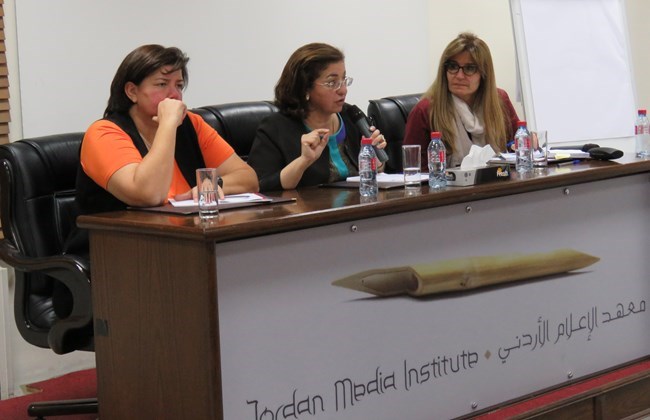Image:

10 Dec 2017
<br />
The Jordan Media Institute (JMI) organized a panel discussion on "Media and Gender," attended by JMI and journalism students from the Technical University of Dortmund in Germany. The discussion hosted writer and journalist Rana Husseini and former Social Development Minister Reem Abu Hassan, who spoke about the situation of women in the media and empowering women politically and economically.<br />
<br />
Former Minister Reem Abu Hassan spoke about empowering women in many sectors. On the media level, Abu Hassan said that Jordan has good and successful examples of women in the media. She praised the fact that Jumana Ghneimat is the first woman editor-in-chief of a daily newspaper in Jordan, and that two women won in the recent elections of the Jordan Press Association Council.<br />
<br />
Abu Hassan spoke about Article 6 of the Jordanian Constitution, which provides for equality between citizens. However, the article does not explicitly provide for equality regardless of gender, as is the case with ethnicity, religion, and language.<br />
<br />
Politically, Abu Hassan said that women occupy political and leadership posts in the Cabinet, Parliament, and municipal and decentralization councils. She spoke about the women's quota in elected councils, saying: "The importance of the quota lies in the fact that it encourages citizens to watch women as decision-makers."<br />
<br />
Abu Hassan added that "Jordan has one of the lowest rates of economic participation of women, noting that many women work in the private sector and manage their own projects." She reviewed several legislative amendments pertaining to women, such as allowing for flexible working hours, motherhood insurance, and stiffer penalties against people who commit murder in the name of honor. She affirmed that "Jordan is a leading state in the region with regard to social protection."<br />
<br />
Husseini, who started her career as a journalist with the English-speaking Jordan Times, said that women have reached advanced positions in terms of the content offered by the media, compared with the previous period in which coverage of women affairs, issues, and violence against them was shy.<br />
<br />
Husseini said that when she started her journalism career, there were few women journalists. Recently, we have seen women in many Arab media outlets, let alone covering wars in conflict zones in the field.<br />
<br />
She said that speaking about violence against women in the media and highlighting these issues was a taboo that was barely discussed. She added that while at the Jordan Times, she benefited from the space given to English-speaking media, compared with Arabic-speaking media, to highlight and investigate women issues and violence against them. She sought to take advantage of this to encourage Arabic-speaking media to go deeper into women issues.<br />
<br />
Husseini said that she had not dreamt that many issues would be discussed in the local media, such as abortion, virginity, violence, drugs, and others on which investigative reports are published. Besides, many journalists have received awards for doing features and reports on these issues.<br />
Husseini spoke about her book "Murder in the Name of Honor," published in English in 2009. The book was translated into Arabic, Dutch, and Finnish. It documented many honor killings that occurred in Jordan and the world and the steps taken by Jordan and other countries toward honor crimes. She affirmed that the job of the journalist is to "highlight what is positive, as well as what is negative."



